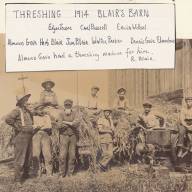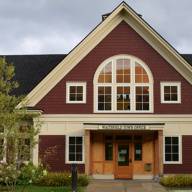Last year Noah Waxman of Starksboro asked Vermont Public’s radio show, Brave Little State, to settle a regional debate involving our family market in central Vermont that has been around for 83 years. The episode is called: “'me-hear-ons' or 'me-hyur-ons'? How to pronounce the name of a beloved central Vermont market.” The result is hilarious, with shoppers trying to say the name. It’s true that the average person struggles. It’s a reality I have lived with for 34 years after Tom Mehuron and I married. And I have news for you, no one can spell it either. Even locals mess it up! Every day of my life someone needs to record my name and I say, “Mehuron—let me spell that for you.” The interesting thing is that this has been going on for centuries! When it occurred on official documents, the family was forced to morph the spelling of the name this way and that.
The Mehurons probably carry the genes of the ancient Scottish family of Machurine. In Dublin, Ireland, Trinity College’s Historical Research Center has documented that Hugh Mahurin, born about 1665 (you see the spelling changes have already begun) emigrated to the colony of Massachusetts in 1690. It’s assumed that he was Scotch- Irish but that is a uniquely American term. Some Scots moved to Ireland seeking religious and political freedom and economic opportunity but didn’t find it in the north of Ireland so they emigrated to the colony of Massachusetts. The Mehurons were very much a part of early colonial life — in fact they are listed on the Mayflower rolls.
Searching on the most popular of the genealogy sites online one comes across the changes of our spelling. After Hugh, two generations of the family Mahurin (born 1718 and 1741) lived in Bridgewater, Massachusetts. Then some documents report a Jonathan Mahurin being born in 1762, who sired Alfred Mehuron, who had sons Horace Mehuron, Allen E. McHuron, Jonathan Mehurin and Henry H. Mahurin. I think that you can see when researching this family, you have to be flexible and careful. Our family historian was Tom’s Aunt Ruth Mehuron McGill who traveled the world to study the family lineage.
In part one of this series, I told about a mysterious set of circumstances recently where my husband and I were called to attend an auction of the Archives of the Mehuron Family. This family has been in Vermont for two and a half centuries. They are true Yankees too. Never throw anything away. Between the five descendants of siblings Allen and Anne Mehuron there are reams of papers. Buckets full of photos. A Civil War rifle. Medals. You name it. So, what the heck? Where did the extra stuff come from?
While I haven’t figured that part out yet, I can say that the two lots auctioned had some junk but also some important surprises. The only way to talk about it is to start at the very beginning. I am most interested in the family once they came to Vermont. That would be Jonathan Mehuron born March 4, 1762, in Plymouth County, Massachusetts.
Jonathan’s mother Anna had died when he was 3 years old on December 23, 1765. And she left him and his twin sister Susanna for his father, David, to raise.
Jonathan turned 13 in 1775. I’m sure you see where I’m going with this: The following year, 1776 is a year of great importance in the history of the United States, as it marked the adoption of the Declaration of Independence and the beginning of the American Revolution. And there was young Jonathan stuck in the middle of it and his father being pressured to join the colonial army. “He was so young,” you might say, “only 13!” Unfortunately, there was the term and tradition that reads, IN HIS STEAD. A man might hire someone to go to war so he could stay home. In some cases, a colonist might send their own child which is what happened to Jonathan Mehuron. A war record shows that Jonathan enlisted in Massachusetts on June 1, 1775 — the Battle of Bunker Hill was 16 days later. Given who his Company and Regiment were it is likely he was there.
Two years later his father David remarried and produced a passel of half-siblings. Yet Jonathan remained on active duty. Can you imagine his feelings about all this? A child forced to grow up quickly and live through the nightmares of war. A Muster and Pay Roll document shows him discharged on July 30, 1780. Would he trudge home to Plymouth County and join his father? Perhaps resentment over his lost childhood was too much to take. And joining strangers in the role of stepmother and her children unthinkable.
I’m certain that Jonathan frequently considered moving north ¾ to a sovereign nation that he had heard so much about ¾ the Republic of Vermont. The majority of new arrivals were less than 26 years old and hell bound for adventure. Vermont's constitution was the first in North America to ban slavery and abolish property restrictions on voting and that may have intrigued him as well.
But author Vrest Orton says that this was not an easy transition as the state was heavily forested to the extent that there was no grass at all. “It was a fine country for squirrels. But since there was no edible grass there could be no cows, horses, or oxen. Our forefathers had to depend on human muscle. . . . Their strength and endurance as related by so many examples. . . . seem unbelievable to us today.”
So, it is likely that our 18-year-old Jonathan Mehuron just started walking north to try to find a better life. Will he find it? Part 3 of the history mysteries of the Mehuron family next time.
If you would like to volunteer for the Waitsfield Historical Society, go to the website and About Us then Join. To help Save the Wait House please send a donation to the Town of Waitsfield/Wait House Reserve Fund, 4144 Main Street, Waitsfield 057673. Venmo@takemebackZ.
Or reach out at













